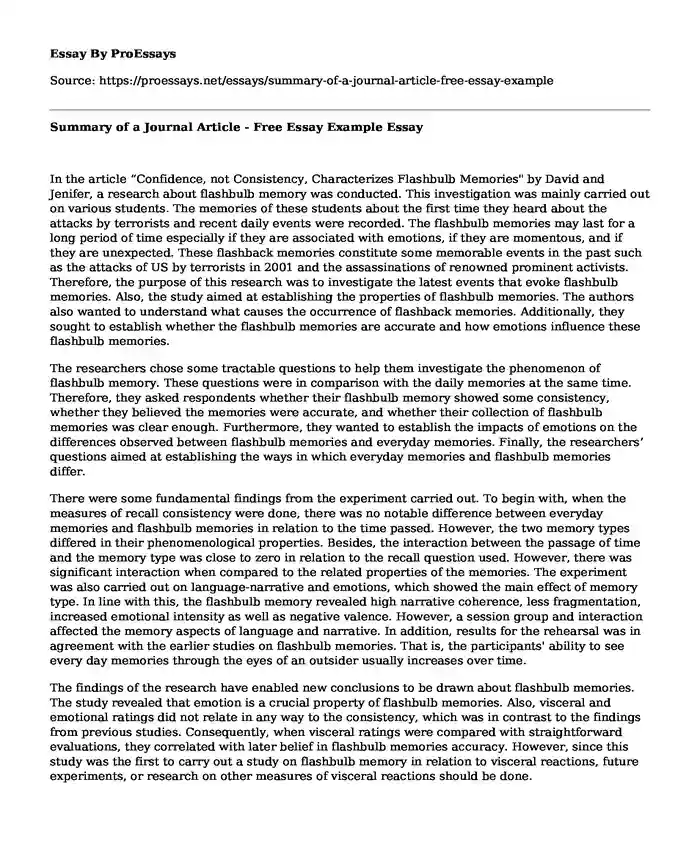In the article “Confidence, not Consistency, Characterizes Flashbulb Memories" by David and Jenifer, a research about flashbulb memory was conducted. This investigation was mainly carried out on various students. The memories of these students about the first time they heard about the attacks by terrorists and recent daily events were recorded. The flashbulb memories may last for a long period of time especially if they are associated with emotions, if they are momentous, and if they are unexpected. These flashback memories constitute some memorable events in the past such as the attacks of US by terrorists in 2001 and the assassinations of renowned prominent activists. Therefore, the purpose of this research was to investigate the latest events that evoke flashbulb memories. Also, the study aimed at establishing the properties of flashbulb memories. The authors also wanted to understand what causes the occurrence of flashback memories. Additionally, they sought to establish whether the flashbulb memories are accurate and how emotions influence these flashbulb memories.
The researchers chose some tractable questions to help them investigate the phenomenon of flashbulb memory. These questions were in comparison with the daily memories at the same time. Therefore, they asked respondents whether their flashbulb memory showed some consistency, whether they believed the memories were accurate, and whether their collection of flashbulb memories was clear enough. Furthermore, they wanted to establish the impacts of emotions on the differences observed between flashbulb memories and everyday memories. Finally, the researchers’ questions aimed at establishing the ways in which everyday memories and flashbulb memories differ.
There were some fundamental findings from the experiment carried out. To begin with, when the measures of recall consistency were done, there was no notable difference between everyday memories and flashbulb memories in relation to the time passed. However, the two memory types differed in their phenomenological properties. Besides, the interaction between the passage of time and the memory type was close to zero in relation to the recall question used. However, there was significant interaction when compared to the related properties of the memories. The experiment was also carried out on language-narrative and emotions, which showed the main effect of memory type. In line with this, the flashbulb memory revealed high narrative coherence, less fragmentation, increased emotional intensity as well as negative valence. However, a session group and interaction affected the memory aspects of language and narrative. In addition, results for the rehearsal was in agreement with the earlier studies on flashbulb memories. That is, the participants' ability to see every day memories through the eyes of an outsider usually increases over time.
The findings of the research have enabled new conclusions to be drawn about flashbulb memories. The study revealed that emotion is a crucial property of flashbulb memories. Also, visceral and emotional ratings did not relate in any way to the consistency, which was in contrast to the findings from previous studies. Consequently, when visceral ratings were compared with straightforward evaluations, they correlated with later belief in flashbulb memories accuracy. However, since this study was the first to carry out a study on flashbulb memory in relation to visceral reactions, future experiments, or research on other measures of visceral reactions should be done.
References
Talarico, J. M., & Rubin, D. C. (2003). Confidence, not consistency, characterizes Flashbulbmemories. Psychological Science, 14(5), 455-461. https://doi.org/10.1111/1467-9280.02453
Cite this page
Summary of a Journal Article - Free Essay Example. (2023, Dec 13). Retrieved from https://proessays.net/essays/summary-of-a-journal-article-free-essay-example
If you are the original author of this essay and no longer wish to have it published on the ProEssays website, please click below to request its removal:
- Definition of Meaningfulness, Happiness, and Morality Using Todd May Ideas
- Sigmund Freud Theory in Explaining Self Character Essay
- Screen Time and Depression Essay
- Mental Illness in Elderly: Rising Mortality, Morbidity & Hospitalization - Essay Sample
- Essay Example on Living With Personality Disorder: A Case Study of Jodie
- Essay Example on Exploring Target Toy Section with My Nephew
- Essay Sample on Overcoming Physical Disabilities: Borges' Perspective







